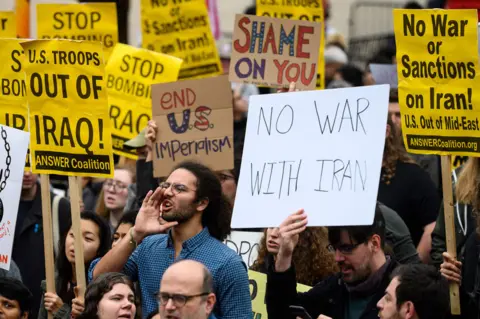Could killing of Iranian general help Trump get re-elected?

 Getty Images
Getty ImagesIt was inevitable that the fallout from the US airstrike that killed Iranian General Qasem Soleimani would spill into presidential politics. Everything spills into presidential politics these days, and this is without a doubt a major story.
With tensions rising between the US and Iran, the long-term consequences will largely depend on the nature of Iran's response to the attack and the intensity of any conflict that follows.
If the end result is a US withdrawal from Iraq, the politics of the situation could be turned on its head, with hawks doing the howling and non-interventionists celebrating.
In the short term, however, there are already some possible implications both for the Democratic presidential primaries that begin in less than a month and November's general election contest.
A wartime president?
Traditionally, a US president facing a major foreign policy crisis benefits from at least a short-term bump in public support.
The "rally around the flag" effect boosted George HW Bush's standing during the 1991 Gulf War. George W Bush saw his approval surge to record levels in the days after the September 11 attacks and subsequent bombing of Afghanistan.
Those were massive military engagements, however. When the stakes have been lower, the tangible political benefits - at least in terms of polling - are harder to discern.
Barack Obama saw no change in his approval ratings during the 2011 air war in Libya. When Donald Trump fired missiles at a Syrian air base in response to that nation's use of chemical weapons, the slight increase in his ratings appear in hindsight to be little more than statistical noise for a man whose approval has been relatively stable throughout his presidency.
The first survey following the Soleimani strike suggests the public will be as sharply divided on Trump's handling of the situation as it has been on everything else this president has done. A slim plurality approve of the action, but a similar plurality also express concern that the president did not "plan carefully enough".
Short of a stunning military victory or a protracted bloody fight, the end result could be simply more of the same when it comes to views on the Trump presidency.
Republican support
Trump could end up benefiting from this episode, however, the way he always seems to benefit from his controversial or incendiary moves - by rallying his base.
In that same Huffington Post poll, 83% of Republicans said they approved of the airstrike. Meanwhile, the president's supporters have gone on the attack, treating the Soleimani strike as the latest way to "trigger" political opponents.
On social media, a common Trumpian response for those expressing concerns about the consequences of the Soleimani strike is "sorry for your loss". The Babylon Bee, a conservative parody website, joked that Democrats want to fly US flags at half-mast to mourn Soleimani's death.
The drama in the Middle East may also help the president by turning national attention away from his impeachment and looming Senate trial. That seemed to be on the president's mind in multiple tweets Monday morning.
"To be spending time on this political Hoax at this moment in our history, when I am so busy, is sad!" he wrote.
Democratic doves
On the Democratic side, the Soleimani strike could invigorate an anti-war movement within the party that has not seriously flexed its muscles since the height of the Iraq War.
Bernie Sanders, one of the Democratic front-runners, was quick to stake out his peace candidate credentials.
"I was right about Vietnam. I was right about Iraq. I will do everything in my power to prevent a war with Iran," he wrote in a tweet that included a video about his anti-war efforts. "I apologize to no one."
 AFP
AFPTulsi Gabbard, another candidate who has vigorously opposed what she views as "regime-change wars" pursued by both parties, said the Soleimani strike was an "act of war" that violated the US constitution.
Those statements stood in contrast to other Democratic candidates, who both condemned Soleimani's record of support for proxy wars against US forces in the region and criticised the wisdom of the attack.
"There are serious questions about how this decision was made and whether we are prepared for the consequences," said Pete Buttigieg. Elizabeth Warren called Soleimani a "murderer". Amy Klobuchar expressed concerns for US troop safety in the region.
Meanwhile, former New York Mayor Michael Bloomberg took aim at Sanders, saying it was "outrageous" for the Vermont senator to call the strike an "assassination" (a word used by several Democratic candidates).
"This is a guy who had an awful amount of American blood on his hands," Bloomberg said. "Nobody that I know of would think that we did something wrong in getting the general."
A rift within the party between progressives and moderates was on display time and again when the topic turned to healthcare during the debates. If the Iran crisis gets hot, the use of military force could become an equally divisive topic.

More on the 2020 race

Biden's challenge
The Huffpost poll on the Soleimani strike had some particularly good news for front-runner Joe Biden, with 62% of Democratic and Democratic-leaning voters saying they "trust" him on Iran. That's well ahead of Sanders and Warren, who 47% said they trust on the subject.
Such a response isn't surprising, given Biden's long record of foreign policy experience, including eight years as vice-president and a lengthy tenure as chair of the Senate foreign relations committee.
That track record isn't entirely a blessing, however, as a focus on the Middle East has once again turned attention to Biden's support for the 2003 Iraq War - and his sometimes muddled defence of it.
In response to a question from a voter in Iowa on Saturday, Biden said that while he voted for the Iraq War authorisation, he opposed President Bush's handling of the conflict "from the very moment" it began.
Biden had spoken in support of the war before and after it was launched, however, and only first expressed regrets about his vote starting in 2005.
The more Biden twists and turns to qualify his Iraq War support, the more media outlets will point out where he is misleading or exaggerating, giving the story national attention - and the more Biden's opponents could sense a weakness they could exploit.
No more oxygen
As if December's impeachment fight didn't make it hard enough for back-of-the-pack Democrats to generate attention amid a flood of major breaking news, now Iran is set to compete with a Senate trial of the president for top billing.
That's bad news for candidates like Cory Booker, Deval Patrick, Tom Steyer and the few other stragglers who are still in the race but languishing in the polls and below the cut-off mark to qualify for upcoming primary debates.
It could also spell trouble for Klobuchar, whose surge in fundraising and Iowa polling of late could prove short-lived if voters become preoccupied with events overseas.
In presidential campaign politics, it helps to be the candidate who gets hot late in the game. With the Iran crisis looming, however, it may end up already being too late.

Who will take on Trump in 2020?

